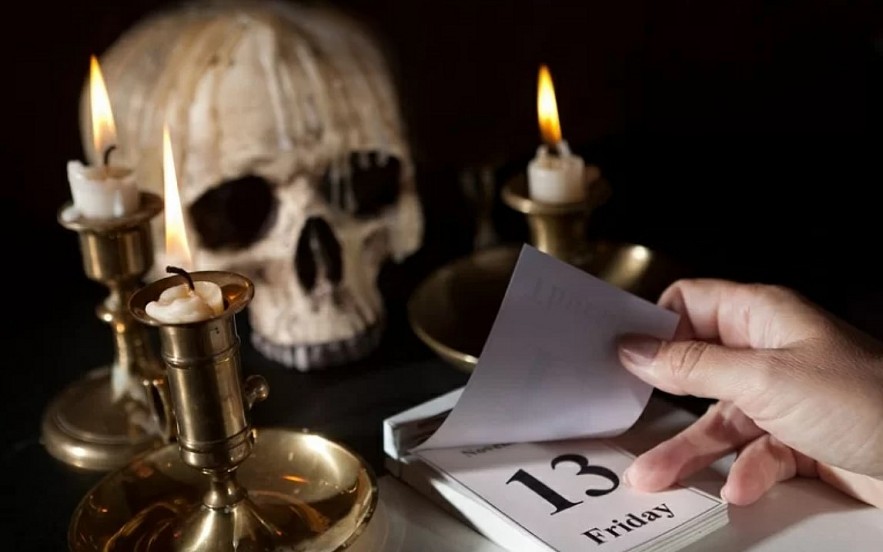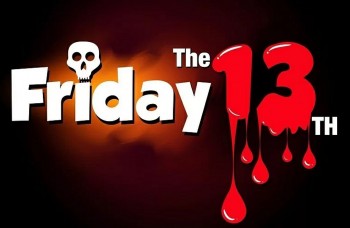Why Everyone is Scared of Friday the 13th
♦ 6 Harmful Misunderstandings About Friday the 13th
Why is Friday the 13th considered unlucky?
Friday the 13th continues to be a day shrouded in superstition, originating from ancient religious doctrines and cultural legends. Contemporary perspectives on the day may be evolving, with numerous individuals perceiving it merely as another date on the calendar.
Although apprehensions endure for certain individuals, others are commencing to contest and recontextualize these entrenched superstitions.
 |
| Why The World Is Afraid of Friday the 13th |
In the traditional belief of Western cultures, Friday is regarded as the most unfavorable day of the week, while the 13th is considered the most ominous day of the month.
The conjunction of these two elements results in an escalating fear associated with Friday the 13th over time.
The fear of Friday the 13th is termed "paraskevidekatriaphobia." "Paraskevi" denotes the sixth, "dekatria" signifies the number 13, and "phobia" refers to fear (in Greek).
It has been mathematically demonstrated that any year contains a minimum of one Friday the 13th and a maximum of three. A year contains three occurrences of Friday the 13th when January 1 falls on a Thursday in non-leap years or on a Sunday in leap years.
Historically, numerous cultures have regarded the number 13 as an omen of misfortune and mortality. The "discrimination" against this number is evident in various contexts, including buildings lacking a 13th floor, hospitals omitting room 13, airports excluding gate 13, and airplanes. Seat number 13 is absent, and cabin number 13 is likewise nonexistent on the ship.
One explanation for this phenomenon is that the number 13 follows the number 12, which is regarded as beautiful and perfect. There are 12 months in a year, 12 Zodiac signs, 12 Olympian gods, 12 labors of Hercules, and 12 apostles of Jesus, among others.
Friday is often associated with "bad news" in numerous legends. Adam and Eve were banished from the Garden of Eden on Friday after consuming the Forbidden Fruit.
The Great Flood, which the deity utilized to chastise humanity, occurred on a Friday, as did the destruction of Solomon's temple. The day Jesus was crucified is also the same day. Six days and thirteen hours.
Due to these historical events, Friday the 13th is designated as the devil's day, associated solely with misfortune and malevolence.
History, and Meaning of Friday the 13th
Researchers have not yet discovered any documentation of this occurrence. These are merely superstitious beliefs transmitted from the 18th century BC.
A multitude of individuals assert that Friday the 13th has biblical roots. Jesus was crucified on Friday, and there were thirteen attendees at the gathering the evening prior to his execution.
Another document asserts that Friday the 13th stems from the misfortune of the Knights Templar, who were defeated by the French king in 1307.
The number 13 has been considered cursed globally for millennia. The buildings notably lack a 13th floor, and neither the room number, hospital, airport, nor street name exhibits the number 13.
For decades, America's financial hub, Wall Street, has harbored a fear of Friday the 13th. In 1989, the Dow Jones Industrial Average experienced its second largest decline.
Reports from the Netherlands indicate that scientists have analyzed the frequency of accidents and incidents occurring on Friday the 13th. The findings indicate a 30% increase in the frequency of accidents and incidents relative to previous reports. the sixth day remaining.
| The Origins of Friday the 13th The adverse connotations of Friday the 13th can be attributed to two separate factors. Historically, the number 13 has been regarded as inauspicious in Western societies. Secondly, Friday, especially within Christian tradition, is regarded as a day of misfortune due to various biblical events linked to it. A notable association between the number 13 and misfortune originates from Christianity, particularly the narrative of the Last Supper. At this renowned event, Judas Iscariot, the betrayer of Jesus, occupied the position of the 13th individual at the table. The treachery resulted in the crucifixion of Jesus, which transpired on a Friday. Dr. Phil Stevens, a retired anthropology professor, informed USA Today, "Thus, 13 is linked to that tragic occurrence." On Friday the 13th, you experience a dual misfortune. This religious association is additionally evident in numerous biblical narratives that link Fridays to adverse occurrences. It is posited that both Adam and Eve were banished from the Garden of Eden on a Friday, and that the Great Flood, which obliterated the majority of humanity, also occurred on a Friday. |
Conclusion
Although rooted in historical and mythological contexts, Friday the 13th continues to influence individuals' lives today. Superstition exemplifies how ancient beliefs can impact contemporary behavior and societal norms, spanning cultural narratives and economic repercussions.
 Why is it called Black Friday - Holiday Shopping? Why is it called Black Friday - Holiday Shopping? What is Black Friday (Holiday Shopping)? Why is it called Black Friday? |
 Good Friday in the Bible: Definition, History, Meaning, Traditions and Facts Good Friday in the Bible: Definition, History, Meaning, Traditions and Facts Check out the history, meaning, traditions and facts of Good Friday in the Bible. |
 6 Harmful Misunderstandings About Friday the 13th 6 Harmful Misunderstandings About Friday the 13th From the point of view of Westerners, Friday the 13th is an extremely bad and unlucky day. Many people have feng shui misconceptions about this ... |
 Tree of the Knowledge of Good and Evil: Symbolism, Meaning and Unique Facts Tree of the Knowledge of Good and Evil: Symbolism, Meaning and Unique Facts Many of us heard about the Tree of Knowledge of good and evil from an early age. What was the Tree of Knowledge? Why is ... |
























